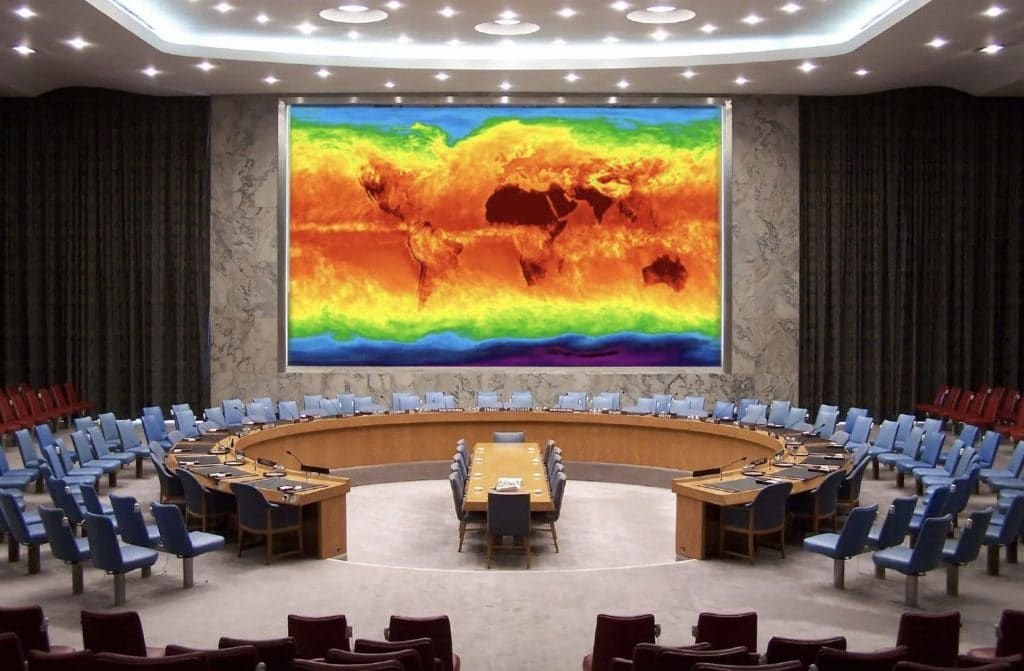Just who are the people in Biden’s climate cabinet?
By Nitish Pahwa | December 24, 2020
 Computer-generated photo illustration of security council and climate change, courtesy bwats2 and AIRS
Computer-generated photo illustration of security council and climate change, courtesy bwats2 and AIRS
Editor’s note: This story was originally published by Slate. It appears here as part of the Climate Desk collaboration.
While centrist and progressive Democrats continue to bicker over their party’s underwhelming down-ballot performance this election cycle, one fact should not escape notice: Joe Biden’s win over Donald Trump was an unabashed climate victory. The president-elect may not have endorsed the Green New Deal, but he nevertheless championed the most ambitious climate plan of any major-party nominee in history (albeit with some hedging on fracking). But thanks to a divided Congress and a hard-right Supreme Court, Biden’s executive team will likely have to play an outsize role in implementing his climate promises.
So just what is the state of Biden’s climate team? Just like with other positions in his incoming administration, the climate leaders so far—many announced over the past few days and weeks—have ranged from excellent to promising to just baffling. Here is a roundup of the nominees and appointees we know for sure, analyzed per their past experiences and what they’ll bring to the table. We’ll update this as more are officially announced.
Deb Haaland, interior secretary: Thursday’s announcement of New Mexico Rep. Deb Haaland’s nomination to head the Interior Department is Biden’s most universally praised move by far, and for good reason. As a member of the Laguna Pueblo tribe, Haaland would be the first Native American to serve as a Cabinet secretary. Her climate consciousness and close experiences with Indigenous tribes will make her an ideal leader of the department that oversees hundreds of millions of acres of public land as well as the Bureau of Indian Affairs. Tribes across the country, alongside environmental and progressive advocacy groups, overwhelmingly pushed for Haaland’s nomination, citing a range of accomplishments and positions that include her opposition to “fracking and drilling on public lands,” her introduction of the Thirty by Thirty House resolution (which aims to preserve at least 30 percent of the land and ocean waters within US territory by 2030), her leadership in the House Committee on Natural Resources, and her ability to effectively work with House Republicans.
Gina McCarthy, White House climate coordinator: The EPA administrator under President Barack Obama was the key driver of efforts such as the Clean Power Plan, countrywide clean water initiatives, and various other environmental protections—much of which have been undone in recent years by conservative politicians and judges. McCarthy had planned to leave politics after her EPA tenure, but after witnessing the environmental destruction under the Trump administration, she started leading the National Resources Defense Council and helped the Biden team develop its climate plan. In this brand-new White House advisory position, she will be “responsible for coordinating climate action across multiple federal agencies and Congress.” Considering her penchant for bold action, her leadership of the incoming administration’s climate committee is absolutely a good sign.
Michael Regan, EPA administrator: Regan is a little less known in the climate and Beltway worlds than many of the other names on this list, but he comes with hefty experience as secretary of the North Carolina Department of Environmental Quality and former EPA air quality specialist under Presidents Bill Clinton and George W. Bush. In North Carolina, he’s earned praise for overseeing “the largest coal-ash cleanup settlement in the country,” according to the New York Times, and for cracking down on chemical companies. While he’s garnered criticism for approving a water quality certification for the Atlantic Coast Pipeline, his national and state record demonstrate a dedicated willingness to tackle climate change.
Jennifer Granholm, energy secretary: As governor of Michigan during the Great Recession, Granholm worked with the Obama administration to ensure that the energy- and transportation-industry bailouts included incentives for car and energy companies to invest in green tech and create more efficient production processes, helping clean up two of her state’s most important (and environmentally damaging) economic sectors. She’s also been a vocal advocate for clean energy and electric cars in her years out of office, so it’s likely she’ll bring that advocacy to this new role.
John Kerry, climate envoy: John Kerry’s comeback to the national political scene gives off strong “the boys are back in town” energy. The former presidential candidate has been a climate hawk for decades: He and Al Gore represented the United States at the first Rio Earth Summit in the ’90s, he spearheaded (failed) cap-and-trade legislation while in the Senate, and he helped negotiate the Paris Agreement while serving as Obama’s secretary of state. As a private citizen during the Trump years, he formed a prominent bipartisan climate coalition to “push for public action on climate change.” While his previous championing of natural gas and dubious carbon markets has raised some eyebrows, his diplomatic experience and international record on climate prioritization make Kerry a strong selection.
Pete Buttigieg, transportation secretary: As noted in Slate magazine, Buttigieg isn’t exactly the most qualified for this role, but he could make some good out of it. In his own presidential campaign, Buttigieg put climate front and center. He spoke about the flooding damage South Bend, Indiana, suffered while he was mayor; put forth ambitious climate proposals; and talked up his record of sustainable transit initiatives, including free electric vehicle charging stations, green firefighting headquarters, and safer streets. No matter what, he will be an improvement over formerly rumored pick Rahm Emanuel as well as current Secretary Elaine Chao. So get ready, because come the new year, that will be Secretary Mayor Pete to you.
Brenda Mallory, head of Council on Environmental Quality: Mallory, a former Obama EPA lawyer, is a promising selection for the Council on Environmental Quality, which coordinates required environmental-impact analyses of new infrastructure projects, from major highway overhauls to energy efficiency of commercial and residential buildings. She helped advise the Biden team regarding government action on climate change and is well-versed on the environmental justice issues facing communities of color, from industrial pollutants to housing quality. So, she’s an ideal pick for this crucial role.
Tom Vilsack, agriculture secretary: Vilsack is among the most concerning of Biden’s Cabinet appointments. As USDA head during Obama’s term, Vilsack oversaw the disastrous spread of a carcinogenic pesticide and failed to offer sufficient financial aid to Black farmers. Not to mention, following his tenure he immediately went on to work an executive job for Big Dairy, making clear his prioritization of emissions-belting agribusiness firms over the little guy. These details led to mass opposition by land workers, grassroots organizations, and even prominent Dems like House Majority Whip Jim Clyburn, who’d suggested hunger expert and longtime farmworker ally Ohio Rep. Marcia Fudge as a popular alternative option. Though Vilsack is not officially part of Biden’s “climate team,” his position will no doubt play a major role in the president-elect’s climate policy.
Together, we make the world safer.
The Bulletin elevates expert voices above the noise. But as an independent nonprofit organization, our operations depend on the support of readers like you. Help us continue to deliver quality journalism that holds leaders accountable. Your support of our work at any level is important. In return, we promise our coverage will be understandable, influential, vigilant, solution-oriented, and fair-minded. Together we can make a difference.















